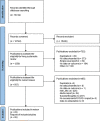Suicide and self-harm in low- and middle- income countries during the COVID-19 pandemic: A systematic review
- PMID: 36962383
- PMCID: PMC10021274
- DOI: 10.1371/journal.pgph.0000282
Suicide and self-harm in low- and middle- income countries during the COVID-19 pandemic: A systematic review
Abstract
There is widespread concern over the potential impact of the COVID-19 pandemic on suicide and self-harm globally, particularly in low- and middle-income countries (LMIC) where the burden of these behaviours is greatest. We synthesised the evidence from the published literature on the impact of the pandemic on suicide and self-harm in LMIC. This review is nested within a living systematic review (PROSPERO ID CRD42020183326) that continuously identifies published evidence (all languages) through a comprehensive automated search of multiple databases (PubMed; Scopus; medRxiv, PsyArXiv; SocArXiv; bioRxiv; the WHO COVID-19 database; and the COVID-19 Open Research Dataset by Semantic Scholar (up to 11/2020), including data from Microsoft Academic, Elsevier, arXiv and PubMed Central.) All articles identified by the 4th August 2021 were screened. Papers reporting on data from a LMIC and presenting evidence on the impact of the pandemic on suicide or self-harm were included. Methodological quality was assessed using an appropriate tool, and a narrative synthesis presented. A total of 22 studies from LMIC were identified representing data from 12 countries. There was an absence of data from Africa, the Pacific, and the Caribbean. The reviewed studies mostly report on the early months of COVID-19 and were generally methodologically poor. Few studies directly assessed the impact of the pandemic. The most robust evidence, from time-series studies, indicate either a reduction or no change in suicide and self-harm behaviour. As LMIC continue to experience repeated waves of the virus and increased associated mortality, against a backdrop of vaccine inaccessibility and limited welfare support, continued efforts are needed to track the indirect impact of the pandemic on suicide and self-harm in these countries.
Copyright: © 2022 Knipe et al. This is an open access article distributed under the terms of the Creative Commons Attribution License, which permits unrestricted use, distribution, and reproduction in any medium, provided the original author and source are credited.
Conflict of interest statement
The authors have declared that no competing interests exist.
Figures



Similar articles
-
The impact of the COVID-19 pandemic on presentations to health services following self-harm: systematic review.Br J Psychiatry. 2022 Oct;221(4):603-612. doi: 10.1192/bjp.2022.79. Br J Psychiatry. 2022. PMID: 35816104 Review.
-
Folic acid supplementation and malaria susceptibility and severity among people taking antifolate antimalarial drugs in endemic areas.Cochrane Database Syst Rev. 2022 Feb 1;2(2022):CD014217. doi: 10.1002/14651858.CD014217. Cochrane Database Syst Rev. 2022. PMID: 36321557 Free PMC article.
-
Beyond the black stump: rapid reviews of health research issues affecting regional, rural and remote Australia.Med J Aust. 2020 Dec;213 Suppl 11:S3-S32.e1. doi: 10.5694/mja2.50881. Med J Aust. 2020. PMID: 33314144
-
The impact of the COVID-19 pandemic on self-harm and suicidal behaviour: update of living systematic review.F1000Res. 2020 Sep 4;9:1097. doi: 10.12688/f1000research.25522.2. eCollection 2020. F1000Res. 2020. PMID: 33604025 Free PMC article.
-
A systematic review of the social and economic burden of influenza in low- and middle-income countries.Vaccine. 2015 Nov 27;33(48):6537-44. doi: 10.1016/j.vaccine.2015.10.066. Epub 2015 Oct 25. Vaccine. 2015. PMID: 26597032 Review.
Cited by
-
Global Suicide Mortality Rates (2000-2019): Clustering, Themes, and Causes Analyzed through Machine Learning and Bibliographic Data.Int J Environ Res Public Health. 2024 Sep 10;21(9):1202. doi: 10.3390/ijerph21091202. Int J Environ Res Public Health. 2024. PMID: 39338085 Free PMC article.
-
Identifying Reddit Users at a High Risk of Suicide and Their Linguistic Features During the COVID-19 Pandemic: Growth-Based Trajectory Model.J Med Internet Res. 2024 Aug 8;26:e48907. doi: 10.2196/48907. J Med Internet Res. 2024. PMID: 39115925 Free PMC article.
-
How Mental Health and Suicidality Changed during the COVID-19 Pandemic: A Longitudinal Study in the General and Psychiatric Population Illustrating Risk and Protective Factors.Behav Sci (Basel). 2024 May 3;14(5):386. doi: 10.3390/bs14050386. Behav Sci (Basel). 2024. PMID: 38785877 Free PMC article.
-
Incidence of suicidal ideation in a cohort of civil servants during the COVID-19 pandemic in Brazil: insights from the ELSA-Brasil Study.Trends Psychiatry Psychother. 2024;46:e20230701. doi: 10.47626/2237-6089-2023-0701. Epub 2024 Jan 6. Trends Psychiatry Psychother. 2024. PMID: 38183668 Free PMC article.
-
Prevalence of mental disorders in South Asia: A systematic review of reviews.Glob Ment Health (Camb). 2023 Nov 13;10:e78. doi: 10.1017/gmh.2023.72. eCollection 2023. Glob Ment Health (Camb). 2023. PMID: 38161740 Free PMC article.
References
-
- Pirkis J, John A, Shin S, DelPozo-Banos M, Arya V, Analuisa-Aguilar P, et al.. Suicide trends in the early months of the COVID-19 pandemic: an interrupted time-series analysis of preliminary data from 21 countries. The Lancet Psychiatry. 2021;8(7):579–88. doi: 10.1016/S2215-0366(21)00091-2 - DOI - PMC - PubMed
-
- Global Burden of Disease Collaborative Network. Global Burden of Disease Study 2019 (GBD 2019) Results. Seattle, United States: Institute for Health Metrics and Evaluation (IHME); 2020.
-
- Ratha D, De S, Kim E, Plaza S, Seshan G, Yameogo ND. Migration and Development Brief 33: Phase II: COVID-19 Crisis through a Migration Lens.2020.
-
- WHO COVID-19 Explorer [Internet]. World Health Organization. 2020 [cited 04/06/2021]. Available from: https://worldhealthorg.shinyapps.io/covid/.
Grants and funding
LinkOut - more resources
Full Text Sources
Research Materials

